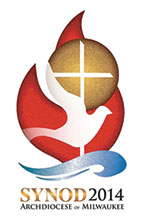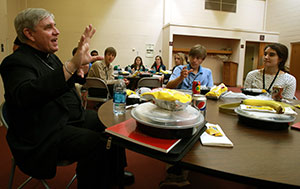Twenty-six high school students participated in the small group discussions that were part of the Archdiocesan Synod but, because they were under age 21, they were unable to vote for their top two initiatives in each mission area. However, they still had a voice regarding the future of the Archdiocese of Milwaukee.
The group had lunch with Archbishop Jerome E. Listecki on Saturday, June 7. During the hour-long gathering, they asked questions of and made statements to the archbishop on a range of church-related topics. He listened and responded.
With Shanedra Johnson, youth minister at St. Michael, Milwaukee; Andrew Schueller, youth and young adult minister, at St. Charles, Hartland; and Gabriela Cabrera, Christian formation director at Cristo Rey and St. Patrick parishes, Racine, all members of the Archdiocesan Synod Preparation Commission, coordinating the event, the dialogue between the archbishop and youth began with one question: “What is the one thing you’d like Archbishop Listecki to keep in mind for the future of the Archdiocese of Milwaukee?”  Archbishop Jerome E. Listecki has lunch with high school students during the Archdiocesan Synod on Saturday, June 7, at the Cousins Center. The students were not voting members of the synod because they are under age 21, but through the luncheon with the archbishop, they still had a voice. Pictured at the archbishop’s table are Jacob Berez and Abby Dedinsky, members of St. Joan of Arc Parish, Delafield. (Catholic Herald photo by Allen Fredrickson)
Archbishop Jerome E. Listecki has lunch with high school students during the Archdiocesan Synod on Saturday, June 7, at the Cousins Center. The students were not voting members of the synod because they are under age 21, but through the luncheon with the archbishop, they still had a voice. Pictured at the archbishop’s table are Jacob Berez and Abby Dedinsky, members of St. Joan of Arc Parish, Delafield. (Catholic Herald photo by Allen Fredrickson)
Jodi Klink, a graduate of Slinger High School, and a member of St. Lawrence Parish, Hartland, replied, “We really need to focus on the people and the members in the church, and really get them more involved in the Mass.”
She suggested people submit weekly questions, and then each week a question be answered in the bulletin, and include a link to a site that would provide further information.
“There are a lot of questions about our faith, and I don’t know everything about it, and I wish I knew more. But who do you ask questions to and what are the answers?” she said.
Her classmate and fellow parishioner, Mitchell Rahlf, explained the approach he takes when talking to peers about his faith.
“I have a lot of friends that struggle with their faith or may not believe in the Catholic faith; when I talk to them now that I feel I’m personal with God again, I can sit down and talk with them, they can understand where I’m coming from because I feel like I’m part of the church now, and for me to express how I express my faith and continue my faith, it gives them power, too,” he said. “They see they’re not the only religion out there; I’m not trying to force my beliefs on them. I’m just simply saying, ‘This is what I believe, this is how I do it. If you like it, you like it; if not, that’s OK, you can follow your own path.’”
Archbishop Listecki spoke to Rahlf’s point.
“You’re living out your faith, you’re charged with it, because you know the love of Christ is motivating you to do this and there’s an urgency about it,” the archbishop said.
He continued, “Everybody talks about, ‘Hey, you’re the future church.’ Baloney! You’re the church. Right now, you’re the church!”
Archbishop Listecki posed a question to the youth: “Thirty years from now, when you’re sitting here in your late 40s, what kind of church are you sharing with those who are 16, 17, 18 years old?”
Mary Kate Baker, a recent graduate of Divine Savior Holy Angels High School, Milwaukee, suggested “a renewal of the church” is critical, noting that youth needed to be aware of their role in the church.
“Each one of us is a part of the Body of Christ and part of the church, even as young people,” she said. “And I hear a lot of my peers at school say, ‘The church does this’ and ‘The church does that.’ I feel sorry for them because we are the church.”
Abby Dedinski, a junior at Catholic Memorial High School, Waukesha, and a member of St. Joan of Arc Parish, Nashotah, initiated a discussion about one’s call in church.
“We can serve the church now, and use our youth as a foundation for the future,” she said. “We all have a vocation right now. Someday, our vocation might be something else.”
Archbishop Listecki said the church and secular world look at “vocation” differently.
“With the church, you, in your very being, are changed by the activity that you are committed to, that you respond to, that God is calling you to be this,” he said.
He used himself as an example, noting that he is a civil lawyer.
“When the church uses the term vocation, it means that once you accept this, it’s sacramental. You are never not that,” the archbishop said. “There are times when I am not a lawyer; there’s never a time when I’m not a priest.”
Other suggestions made to Archbishop Listecki included the church having more of a media presence, a Catholic-sponsored family weekend each summer, hiring more young adults to work in the offices of the archdiocese, and being a “leader in creating more unity among people everywhere.”
The archbishop praised and thanked the youth “for making the sacrifice” to participate in the synod.
“You make sacrifices because you love what you’re doing,” he said. “Thank you for loving the church and liking your parishes and for being willing to profess that.”
He reminded them that they “energize us.”
“When those who are in their 50s, or their 40s, see you as enthusiastic about the church, living out the Gospel, and about pursing those paths, they get energized!” Archbishop Listecki said.
